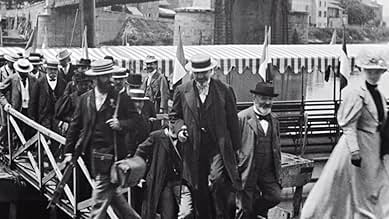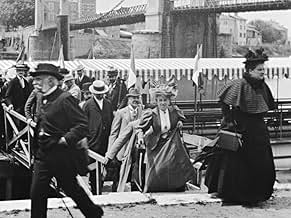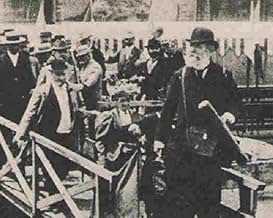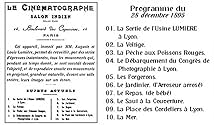VALUTAZIONE IMDb
5,7/10
2085
LA TUA VALUTAZIONE
Aggiungi una trama nella tua linguaThe photographers who need to participate in the congress of Lyon get off a boat in Neuville-sur-Saône, dividing to the right and left.The photographers who need to participate in the congress of Lyon get off a boat in Neuville-sur-Saône, dividing to the right and left.The photographers who need to participate in the congress of Lyon get off a boat in Neuville-sur-Saône, dividing to the right and left.
P.J.C. Janssen
- Self
- (non citato nei titoli originali)
Recensioni in evidenza
To many historians, December 28, 1895, is the date considered as the day where cinema was born, as it was in that cold day of winter when the brothers Auguste and Louis Lumière gave the first public screening of their new invention, the Cinématographe. The brothers' devise would change history of entertainment forever, as it took the idea of motion pictures from the uncomfortable and individual experience of Edison's Kinetoscope, to the more enjoyable atmosphere of a movie projected on a screen. On that day the brothers showed 10 films, and the majority of them were of the kind that later would be known as "actuality films", movies showing an everyday event. However, one of the 10 films was a bit more than a typical "actuality film", as it was actually the register of an event in a fashion more akin to what we know now as documentary films: it was the arrival of the Photographical Congress to Lyon.
While December 28, 1895, was certainly the very first time the brothers showed their invention to the world, it wasn't really the first time the brothers' invention was shown to an audience, as months earlier, the brothers had been doing private screenings for the scientific community of France. The 1895 Photographical Congress that was celebrated at the community of Neuville-sur-Saône in Lyon, was one of the places where the Lumières screened their films for the first time. "Neuville-sur-Saône: Débarquement du congrès des photographes à Lyon", is essentially the recording of the arrival of the members of the Photographical Congress to Neuville-sur-Saône, marking the first time a camera was used to capture something more "special" than people moving or trains arriving. This time the new medium was being used to actually register the event in real time, pretty much in the same way as TV News work today.
Nevertheless, that was not the only thing that "Neuville-sur-Saône" an interesting early short film. The movie was shot when the Congress arrived, early in the morning, and that very same day was shown to its protagonists in the afternoon. One has to wonder how the photographers felt when they saw the images of their arrival actually moving, as if the even was being enacted again. The very same people that looked into the camera (perhaps thinking it was a normal photography) was now watching themselves in a motion picture depicting short seconds of their lives. It was certainly a unique experience, and no doubt the success of "Neuville-sur-Saône: Débarquement du congrès des photographes à Lyon" and their other films that day prompted the brothers to keep working in their preparation for that December day, when the world witnessed what a group of photographers did (and saw) months ago. 7/10
While December 28, 1895, was certainly the very first time the brothers showed their invention to the world, it wasn't really the first time the brothers' invention was shown to an audience, as months earlier, the brothers had been doing private screenings for the scientific community of France. The 1895 Photographical Congress that was celebrated at the community of Neuville-sur-Saône in Lyon, was one of the places where the Lumières screened their films for the first time. "Neuville-sur-Saône: Débarquement du congrès des photographes à Lyon", is essentially the recording of the arrival of the members of the Photographical Congress to Neuville-sur-Saône, marking the first time a camera was used to capture something more "special" than people moving or trains arriving. This time the new medium was being used to actually register the event in real time, pretty much in the same way as TV News work today.
Nevertheless, that was not the only thing that "Neuville-sur-Saône" an interesting early short film. The movie was shot when the Congress arrived, early in the morning, and that very same day was shown to its protagonists in the afternoon. One has to wonder how the photographers felt when they saw the images of their arrival actually moving, as if the even was being enacted again. The very same people that looked into the camera (perhaps thinking it was a normal photography) was now watching themselves in a motion picture depicting short seconds of their lives. It was certainly a unique experience, and no doubt the success of "Neuville-sur-Saône: Débarquement du congrès des photographes à Lyon" and their other films that day prompted the brothers to keep working in their preparation for that December day, when the world witnessed what a group of photographers did (and saw) months ago. 7/10
From a boat descend the photographers who must participate in the congress of Lyone dividing in two diagonals to the right and left. After, someone greets the film operator. So the illusion of the dimension of the cinema is broken.
This film is a virtual remake of 'Sortie d'Usine', perhaps making it the first self-referential movie. Instead of the workers streaming out of the factory, we have fellow cinematograph specialists disembarking a liner for a congress. Instead of workers silently doing their masters' bidding, we have colleagues, friends, peers, fearlessly greeting the camera as equals.
This is a film about film - the Congressionists walk with their cameras; this film was precessed immediately for viewing at the conference. Already, the Lumieres' desire to 'objectively' record the world has turned into a naval-gazing admission of defeat, of the impossibility of objectivity untainted by subjectivity or ideology. Godard once suggested that the most honest film would be of a camera recording itself in a mirror. This film is an early grasping of what he means.
This is a film about film - the Congressionists walk with their cameras; this film was precessed immediately for viewing at the conference. Already, the Lumieres' desire to 'objectively' record the world has turned into a naval-gazing admission of defeat, of the impossibility of objectivity untainted by subjectivity or ideology. Godard once suggested that the most honest film would be of a camera recording itself in a mirror. This film is an early grasping of what he means.
Neuville-sur-Saône: Débarquement du congrès des photographes à Lyon (1895)
The title of this Lumiere Brothers film pretty much tells you what you're looking at. We see a group of people walking off a riverboat and coming close to the camera who catches their every move. There's certainly nothing ground-breaking about this early "actuality" movie but if you're a fan of these then you're bound to enjoy this one. I always enjoy watching these because it gives you a great chance to see how things were so many years ago. This one here features a lot of people so you get a terrific idea of the type of clothing that was worn during this period as well as a chance to see the various other things going on. This here is well worth watching if you enjoy these movies.
The title of this Lumiere Brothers film pretty much tells you what you're looking at. We see a group of people walking off a riverboat and coming close to the camera who catches their every move. There's certainly nothing ground-breaking about this early "actuality" movie but if you're a fan of these then you're bound to enjoy this one. I always enjoy watching these because it gives you a great chance to see how things were so many years ago. This one here features a lot of people so you get a terrific idea of the type of clothing that was worn during this period as well as a chance to see the various other things going on. This here is well worth watching if you enjoy these movies.
I watched this film on a DVD that was rammed with short films from the period. I didn't watch all of them as the main problem with these type of things that their value is more in their historical novelty value rather than entertainment. So to watch them you do need to be put in the correct context so that you can keep this in mind and not watch it with modern eyes. With the Primitives & Pioneers DVD collection though you get nothing to help you out, literally the films are played one after the other (the main menu option is "play all") for several hours. With this it is hard to understand their relevance and as an educational tool it falls down as it leaves the viewer to fend for themselves, which I'm sure is fine for some viewers but certainly not the majority. What it means is that the DVD saves you searching the web for the films individually by putting them all in one place but that's about it.
Anyway onto this film which is as the title suggests, lots of people getting off a boat. This is essentially a rerun of the Lumière film that saw lots of people leaving a factory and it is as exciting. The only thing that did make it interesting to me was the people in question react differently from those leaving the works in the other film. Maybe it is to do with their class, or maybe they are more savvy about cameras or maybe they are just told to do this but some wave, smile etc a reaction you would get today but interesting to see it then when such a thing was very much a novelty.
Other than this point of interest though, I found the film to be what it now is a historical novelty that can only be seen as such.
Anyway onto this film which is as the title suggests, lots of people getting off a boat. This is essentially a rerun of the Lumière film that saw lots of people leaving a factory and it is as exciting. The only thing that did make it interesting to me was the people in question react differently from those leaving the works in the other film. Maybe it is to do with their class, or maybe they are more savvy about cameras or maybe they are just told to do this but some wave, smile etc a reaction you would get today but interesting to see it then when such a thing was very much a novelty.
Other than this point of interest though, I found the film to be what it now is a historical novelty that can only be seen as such.
Lo sapevi?
- ConnessioniEdited into The Lumière Brothers' First Films (1996)
I più visti
Accedi per valutare e creare un elenco di titoli salvati per ottenere consigli personalizzati
Dettagli
- Data di uscita
- Paese di origine
- Lingua
- Celebre anche come
- The Photographical Congress Arrives in Lyon
- Luoghi delle riprese
- Azienda produttrice
- Vedi altri crediti dell’azienda su IMDbPro
- Tempo di esecuzione
- 1min
- Colore
- Mix di suoni
- Proporzioni
- 1.33 : 1
Contribuisci a questa pagina
Suggerisci una modifica o aggiungi i contenuti mancanti





















